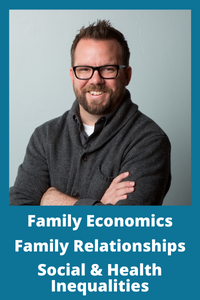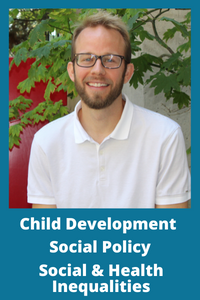Department of Family and Consumer Studies
Faculty Research
Interim Department Chair Dan CarlsonI am a family sociologist who applies life course, developmental, stress process, and gender structure frameworks to examine the role of families in shaping health disparities and social inequalities within US society, especially as they pertain to work-family issues and adolescent development. My most recent work aims to understand the causes and consequences of the gendered division of domestic labor. I am currently conducting a multi-wave survey study with support from the National Science Foundation examining changes in parents' divisions of paid and unpaid labor during and after the COVID-19 pandemic. My research has been featured in numerous media outlets including the New York Times, Washington Post, Wall Street Journal, the Atlantic and Time.
|
|
Assistant Professor David CurtisDavid has an active research program at the intersection of human development, population
health, and public policy. Seeking to identify upstream causes of group inequities
in health, David’s research focuses on the patterning of stress exposures and health
behaviors by race, socioeconomic factors, and place. His policy research examines
how local governments can invest in under-resourced neighborhoods in order to reduce
health inequities.
|
|
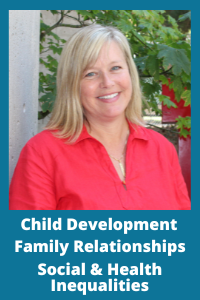 |
Professor Marissa Diener
Marissa Diener is a developmental psychologist whose research addresses complex and challenging social issues that face children and youth and impact their well-being. My research assumes that children's characteristics as well as various aspects of family relationships, including parent-child interactions and their impact on development, parents' behavior and expectations, parent-child relationships, and the person-family-in-context are important for children's development. Her research examines factors that are important to child and youth well-being, especially in the context of family relationships, various dimensions of parent-child interaction and their impact on children's development, and the intersection of healthcare and children's well-being. She has a current project with Dr. Lukas Lopez on parents' emotional expressivity toward their children and another set of studies examining the impact of cytomegalovirus on children's development and family well-being. She is interested in understanding factors that promote positive development.
|
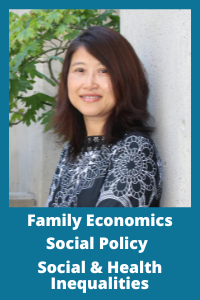 |
Professor Jessie FanDr. Jessie Fan's research focuses on individuals and households' economic and physical
well-being, both in the U.S. and other countries, such as China. Within the area
of economic well-being, she studies household decision-making on consumption, saving,
and credit use, both in terms of general patterns, subgroup differences, and the impact
of government regulations.
|
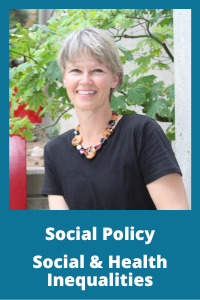 |
Professor Lori Kowaleski-JonesLori Kowaleski-Jones, Ph.D., is a Professor and past Chair (2015-2021) for the Department of Family and Consumer Studies Department. She is a core faculty member in the Masters of Public Policy Program, contributing a course in survey research methods. She also serves on the executive board of the Wasatch Front Research Data Center. Kowaleski-Jones is a sociologist, with training in family demography and public policy. Her primary research interests are in the areas of physical and social wellbeing of individuals and families with a focus on how public policy, food insecurity, neighborhood environments, and family factors maximize individual wellbeing across the life course. Over the past ten years, a key focus of her research has been a team science effort with colleagues in the Energy Balance Research Group to assess the role of the built environment for health outcomes. Currently, she is the PI on an NIDDK/NIH R01 project that examines the role of the neighborhood environment in the transmission of intergenerational diabetes risk using data from the Utah Population Database. Additionally, other current work involves an intervention aimed at increasing the reach of the Earned Income Tax Credit (EITC) and Child Tax Credit programs through innovatively extending the provision of free tax preparation via partnerships with the health care system and community organizations. EMAIL PROFESSOR KOWALESKI-JONES
|
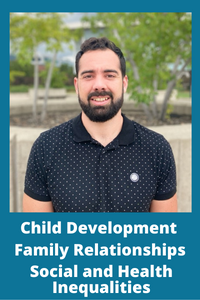 |
Assistant Professor Lukas LopezI am a developmental psychologist with interests in affective science and communication
in infancy and childhood. My research examines the role of communication dynamics
for early social learning, with a particular focus on the influence of learning environments
such as homes from diverse socioeconomic and cultural backgrounds, early care and
education centers, and outdoor settings. I am also interested in the association between
people’s emotions, moral judgements, and decision making, especially around issues
related to inequality. Using a variety of research methodologies including home recordings,
lab experiments, parent surveys, and structured child-caregiver conversations, my
research aims to decipher the impact of communication on children’s development of
language and values.
|
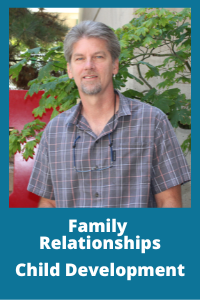 |
Professor Kevin RathundeMy research focuses on the developmental and educational importance of deeply engaging, intrinsically motivated experiences that are sometimes referred to as “flow” experiences. My past work has primarily explored how flow can enhance learning, talent development, and creativity, and how various environments (e.g., family, school, nature) can enhance or disrupt such experiences. My current research has moved in a more applied, community-focused direction and utilizes the arts to help communicate scientific findings. More specifically, in order to better communicate the value of flow and nature experiences to military families in Utah, a recent study developed an educational presentation that integrated the creative arts (i.e., music, film, photography, dance, and graphic design) with research-based information on the benefits of nature for health. |
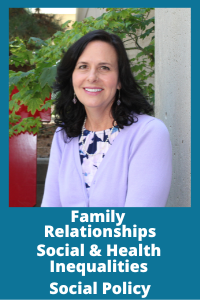 |
Professor Sonia SalariSonia Salari, PhD is a sociologist with a specialty in gerontology, aging services, family violence, diversity and public policy. Known as an advocate for victims, her research on elder abuse and lethal domestic violence led her to study intimate partner murder-suicides across age groups. Her work is published in multiple journals, and a book, Family Violence Across the Life Course: Research, policy and prevention (2021 2nd Ed. Kendall Hunt). As a family sociologist and gerontologist, I am interested in quality of life (QOL)
in the home and formal settings across the life course. Public health and family well-being
are intertwined. My research examines gender-based violence, mental/physical health,
abilities, race/ethnic/immigrant diversity and elder mistreatment. QOL can be enhanced
in formal aging services and long-term-care by giving adult participants safety, autonomy
and age appropriate status. Due to the hidden nature of family violence, I study the
more visible lethal outcomes such as homicide and suicide among young, middle aged
and elder adults. Femicide in the home is a consistent theme across ages, but the
patterns differ. There are implications for domestic violence policy and prevention
which take into account the pandemic, racial and income inequalities, along with the
aging of the population.
|
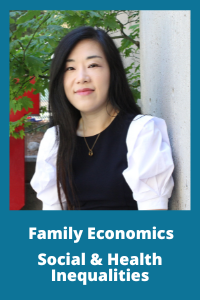 |
Assistant Professor Su ShinAs a consumer economist conducting interdisciplinary research, I focus on the American family’s economic and personal wellbeing. My research seeks to identify factors that relates to cognitive functioning and its effect on the financial and economic outcomes for older adults and their families. My research also explores the impact of informal care on their financial and health outcomes. I investigate what explains American households’ financial decisions, such as those for savings and investments. I also examine the heterogeneous effects of natural disasters on health outcomes, coping behaviors, and economic hardship according to vulnerabilities and whether federal and local government efforts mitigate their effects. EMAIL ASSISTANT PROFESSOR SHIN
|
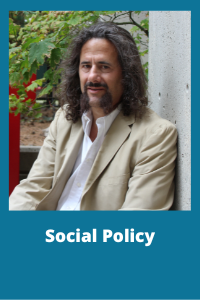 |
Professor Nicholas WolfingerNicholas H. Wolfinger is the author of Understanding the Divorce Cycle: The Children of Divorce in Their Own Marriages (Cambridge University Press, 2005), Fragile Families and the Marriage Agenda (edited, with Lori Kowaleski-Jones; Springer, 2005), Do Babies Matter? Gender and Family in the Ivory Tower (with Mary Ann Mason and Marc Goulden; Rutgers University Press, 2013), and, most recently, Soul Mates: Religion, Sex, Children, and Marriage among African Americans and Latinos (with W. Bradford Wilcox; Oxford University Press, 2016). Wolfinger is also the author of about 40 articles or chapters, as well as short pieces in The Atlantic, National Review, Huffington Post, and other outlets. He is currently working with Matthew McKeever on a book on the changing economics of single motherhood to be published by Oxford University Press. Much of his previous research examined the intergenerational transmission of divorce--why people from divorced families are likely to end their own marriages. Most of Professor Wolfinger's work involves multivariate analysis of data from national sample surveys and ethnographic methods.
|
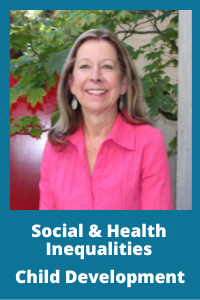 |
Professor Cheryl WrightDr. Cheryl Wright's current research centers on a community-based participatory research (CBPR) focused on students with autism and their families. She is the co-founder of NeuroVersity - a technology based educational program for students with autism and related disorders. The program leverages 3D design software to enhance the social, personal and vocational skills of participating students. The program is strength-based (visual-spatial skills) and interest focused. The NeuroVersity research team has published 20 papers focusing on the student, parent, sibling and grandparent involvement in the program. The long-range goal of the program is employment since individuals with autism have some of the highest rates on unemployment, and underemployment. The program that started in Salt Lake City has been replicated in 4 states and South Africa.
|
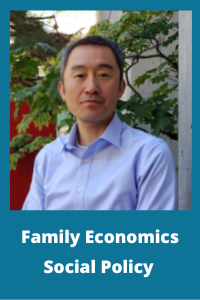 |
Associate Professor Zhou YuDr. Zhou YU’s research focuses on the intersection between housing and migration. He is an expert on household formation, homeownership attainment, and migrant adaptation. His research has shed light on the generational divide in housing attainment—an important aspect of wealth inequality. He has also worked on consumer fraud and urbanization. His research has been supported by institutions such as TD Ameritrade Institutional, the Russell Sage Foundation, and Chiang Ching-kuo Foundation for International Scholarly Exchange. His publications have appeared in journals such as Habitat International, International Migration Review, and Housing Studies. Trained in the fields of demography and planning, he received his PhD from the University of Southern California. |

